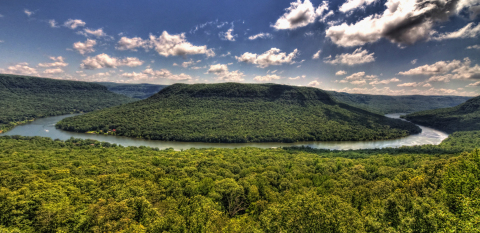CHATTANOOGA, Tenn.--(BUSINESS WIRE)--The Tennessee River Gorge Trust announced today that 63 acres of land have been protected in the river gorge over the past 14 months through three separate purchases and one generous donation. These new acquisitions will be added to the more than 17,000 acres already under the protection of the nationally recognized land trust.
The Tennessee River Gorge is a lush canyon that stretches along 27 miles of the Tennessee River, winding through the Cumberland Mountains to the west of Chattanooga, Tenn. This vast river gorge encompasses 27,000 acres, and since 1981 the Tennessee River Gorge Trust has protected more than 17,000 acres of that through land acquisition, partnerships with private property owners to create conservation easements, and memorandums of understanding.
“We are delighted with the progress we are making to protect this natural treasure,” said Tennessee River Gorge Trust Executive Director Rick Huffines, who joined the Trust in 2012 upon retirement from the U.S. Fish and Wildlife Service. The Trust’s recent additions include one 35-acre tract that was donated and three other tracts totaling 28 acres purchased from willing sellers. An additional eight-acre tract is currently under contract for purchase.
“Each protected tract helps to piece together a critical landscape that is home to a wide variety of plants, birds, and mammals, as well as a number of important archaeological sites,” Huffines said. “The Trust was formed in 1981 to ensure that the gorge was not overdeveloped, and today the nonprofit has renewed its focus on stewardship and partnering with property owners who want to preserve, protect and steward this epic land treasure.”
The Tennessee River Gorge is a pristine wilderness located in proximity to urban life in Chattanooga. Access to the gorge, as well as research and stewardship of all that is found there, is a top priority. “We want to engage the community with the gorge and start working with what’s beneath the canopy,” Huffines said. “If we don't get people into the gorge, they can't begin to truly appreciate why we need to protect it.”
Current research efforts focus on a known indicator species (a species that can signal a change in the condition of a particular ecosystem): birds. In 2014, the group received a generous grant from the Benwood Foundation and constructed a remote bird-banding station in a section of the gorge known as Cash Canyon. During peak migration months in the spring and fall, licensed field biologists work to harmlessly capture, band and release songbirds, woodpeckers and hummingbirds. Information gained from this process helps the Trust make informed decisions related to future stewardship and land acquisition projects. All of the information is later sent to the U. S. Geological Survey’s Bird Banding Laboratory in Patuxent, Maryland to be stored in an internationally accessible database.
Throughout the year, families, school groups, individuals and the media often join researchers for bird-banding excursions. In 2015, the Trust opened two cabins and two tent-camping sites within the gorge to provide overnight accommodations for bird-banding participants.
The Trust is involved in surveys of the Cerulean Warbler, the fastest-declining songbird in North America, as well as the Worm-eating Warbler, in partnership with the Biology, Geology and Environmental Science Department at the University of Tennessee at Chattanooga.
The Trust is currently developing an independent research project to outfit neo-tropical migrant bird species with geolocators to track their winter migration to Central and South America. Huffines envisions this project as a way to build an ecological and cultural connection with Latin American countries and the Latino community in Chattanooga.
“We want our research projects to inform us as to what we need to do to keep the forest in equilibrium,” Huffines says.
Archaeological research within the gorge reveals that native people have long lived along the banks of the Tennessee River. Evidence of these prehistoric inhabitants has been discovered in caves and along bluff lines throughout the Cumberland Plateau, including the Tennessee River Gorge.
Recent discoveries within the gorge include black charcoal drawings that date back at least 700 years on the walls of a cave located near Trust property and a unique stone feature located on Trust property that is being investigated to determine if it is an ancient burial ground.
In recent years, the Trust has created more opportunities for the community to explore the gorge. “Young people want more access to the Tennessee River Gorge and we are committed to staying relevant to the next generation. We’ll be working on more ways to explore the gorge,” Huffines said.
A 3.5-mile loop trail located at the historic Pot Point Cabin along River Canyon Road is a moderately strenuous journey featuring some steep climbs to Azalea Point on Walden’s Ridge. The Ritchie Gulf Trail, which is being constructed in partnership with Rock/Creek Outfitters, Southeast Conservation Corps, and Prentice Cooper State Forest, will begin at the Pot Point Cabin and climb 3.5 miles through Prentice Cooper State Forest.
Overnight options within the gorge include two campsites along the Tennessee River Blueway - one at the Pot Point Cabin and another on Williams Island in downtown Chattanooga. There is no cost for these sites, but reservations must be made through the Trust. Reservations can also be made for the Pot Point Cabin along River Canyon Road. Visitors interested in participating in the bird banding activities can contact the Trust by email at info@trgt.org to discuss a visit.
The Trust continues to develop community partnerships, research opportunities and educational programs in an effort to offer access to scenic sites within the gorge – a stunning landscape like nowhere else on earth. To learn more, visit www.trgt.org or email us at info@trgt.org.




